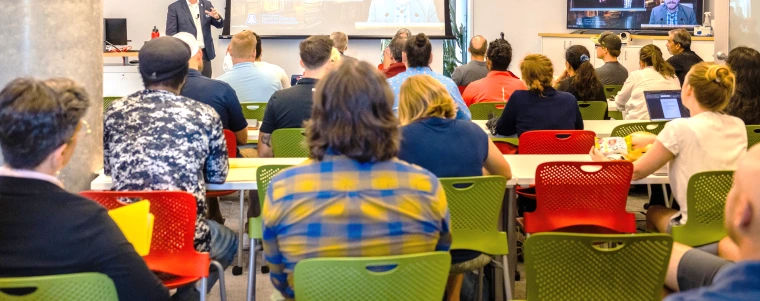
Signature Workshop Series
Structured in three two-hour sessions over five weeks, this in-person workshop series will follow a flipped format (participants will read/prepare work in advance) and explore SoTL research questions, study designs, and methods of data collection and analysis. The workshop, open to faculty and the U of A community, aims to support SoTL project design at our institution, particularly through proposals for CUES Distinguished Fellowships.
Workshop Dates & Preparation
|| THU, JAN 30, 1-3 PM | Session 1: Generating your research questions
In this session, we will explore the characteristics of productive research questions for SoTL projects. Planned activities include discussion of key characteristics of effective SoTL research questions, highlights from accepted CUES proposals, and guided workshopping of participant project ideas. By the end of the session, participants will walk away with a revised research question (or set of questions) for their own SoTL project idea.
Required Preparation:
- Read Chap 4, Generating the Research Idea (Bishop-Clark & Dietz-Uhler)
- Complete the Generating Your Research Idea Worksheet on pgs. 8-10, based on questions/a topic area that (1) engage your interest, (2) have educational value in your field or generally, (3) leverage your strengths or professional assets. (Please bring completed worksheet in printed or digital form)
- Come with a narrative paragraph articulating your research goals for a current or future SoTL project. Please be prepared to workshop these with your colleagues during the session. (We highly encourage coming with these in writing)
|| THU, FEB 6, 1-3 PM | Session 2: Aligning your theoretical frame and study design
In this session, we will explore the relationship between theoretical framing and study design for SoTL projects. Planned activities include a discussion of aligning theory and study design to research questions in general. Participants will receive guidance for crafting the study design and theoretical framing sections of a SoTL proposal. By the end of this session, participants will be able to articulate the relationship between research questions, theoretical frame, and study design.
Required Preparation:
- Read Chap 5, Designing the Study (Bishop-Clark & Dietz-Uhler)
- Complete the Designing Your Study Worksheet on pgs. 61-62. (Please bring completed worksheet in printed or digital form)
- Read selection from Chap 3, How Do I Get Started? (McKinney), focusing on pgs. 33-34. Come prepared to discuss the following questions:
- What theories or models will guide your data collection and analysis?
- How will those theories or models guide your data collection and analysis?
TIP. Consider what keywords/resources may be useful in approaching these questions. (e.g. See Appendices in Bishop-Clark & Dietz-Uhler for reference.)
|| THU, FEB 27, 1-3 PM | Session 3: Exploring data collection and analysis
In this session, we will explore how to approach data collection and analysis for SoTL projects. Planned activities include a discussion of quantitative vs. qualitative methods for SoTL projects, an alignment analysis of project design elements, and continued workshopping of participant project ideas. By the end of this session, participants will have identified methods of data collection and analysis they may use to answer their research questions.
Required Preparation:
- Read Chap 6, Collecting the Data (Bishop-Clark & Dietz-Uhler)
- Read Chap 7, Analyzing the Data (Bishop-Clark & Dietz-Uhler)
- Complete (and Bring!) both the Designing Your Data Collection Plan Worksheet (pgs. 79-80) and Analyzing Your Data Worksheet (pgs. 100-101)
Accessibility
Environment & Natural Resources 2 (ENR2)
Room N595 (Fifth Floor, North Side)
1064 E. Lowell St.
Tucson, AZ, 85719
Closest Parking: Sixth Street Garage

